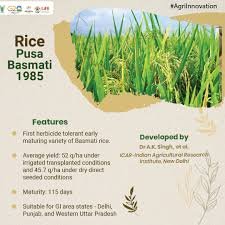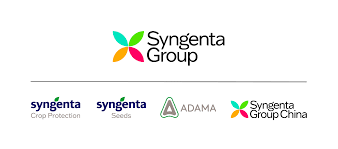IARI launches seed sale of RobiNOweed Basmati rice varieties DSR cultivation
Pusa Basmati 1979 and Pusa Basmati 1985 are the first non-GM herbicide tolerant Basmati rice varieties tolerant to Imazethapyr 10% SL to be released for commercial cultivation in India.
Pusa Institute, New Delhi launched the seed sale of RobiNOweed Basmati Rice Varieties namely, Pusa Basmati 1979 and Pusa Basmati 1985 tolerant to Imazethapyr 10% SL for Direct Seeded Rice cultivation. Speaking on the occasion, Dr Ashok Kumar Singh, the Director, IARI, New Delhi highlighted that the major concerns in rice cultivation in north- western India include (a) depleting water table (b) labor scarcity for transplanting of rice and (c) the emission of greenhouse gas, methane under transplanted flooded condition. Direct seeded rice can address all these concerns. DSR reduces water usage significantly compared to traditional flooding method due to no continuous flooding, targeted water application, lower percolation losses, and decreased evaporation. Studies suggest DSR can save approximately 33 per cent of the total water requirement making it a sustainable choice, particularly in water scarce regions.
However, weeds are a major problem under DSR which needs to be addressed in order to ensure the success of DSR. In this direction, concerted research at ICAR-IARI, New Delhi has led to the development of two RobiNOweed Basmati rice varieties, Pusa Basmati 1979 and Pusa Basmati 1985 which are the first non-GM herbicide tolerant Basmati rice varieties tolerant to Imazethapyr 10% SL to be released for commercial cultivation in India.
Pusa Basmati 1979
Pusa Basmati 1979 is a MAS derived herbicide tolerant near-isogenic line of Basmati rice variety “PB 1121” possessing mutated AHAS allele governing tolerance to Imazethapyr 10 per cent SL with seed-to-seed maturity of 130-133 days and average yield of 45.77 q/ ha under irrigated transplanted condition across two years of testing in the National Basmati trials.
Pusa Basmati 1985
Pusa Basmati 1985 is a MAS derived herbicide tolerant near-isogenic line of Basmati rice variety “PB 1509” possessing mutated AHAS allele governing Imazethapyr tolerance with seed-to-seed maturity of 115-120 days and average yield of 5.2 t/ha under irrigated transplanted condition across two years of testing in the National Basmati trials.
He elaborated extensively on the package of practices tailored for these two rice varieties when cultivated under Direct Seeded Rice (DSR) method. He stressed the importance of adopting necessary precautions for effective weed management in these crops. Given their tolerance to the broad-spectrum herbicide Imazethapyr 10 per cent SL, these varieties are poised to revolutionize weed control in DSR, thereby streamlining the cost of Basmati rice cultivation. Moreover, these varieties not only reduce the labour-intensive processes associated with weeding but also mitigate the environmental impact of traditional rice cultivation methods. This underscores their potential to contribute significantly to sustainable agriculture practices and the overall well-being of the agricultural ecosystem.
Dr. P.K. Singh, Commissioner of Agriculture at the Ministry of Agriculture and Farmers Welfare, Government of India, underscored the importance of these varieties and appreciated the contribution of IARI in bringing improvements in the varietal traits targeted towards saving water, increasing yield with better climate resilience.
Dr D.K. Yadav, ADG(Seeds) at ICAR in New Delhi, emphasized the boon these two Basmati rice varieties would represent for farmers in the Basmati GI area. He highlighted the paramount importance of seeds as the primary input for crop cultivation.
Notably, IARI Basmati rice varieties hold a staggering 95 per cent share in the country’s total Basmati rice exports, which amounts to a whopping 51,000 crores. Dr Yadav urged farmers to actively promote these improved varieties to safeguard the food security of the nation. As a tangible step forward, seeds of these varieties were given to four farmers hailing from Haryana, Punjab, Delhi, and Uttar Pradesh. The other interested farmers were provided the seeds of these varieties from SPU on payment basis at a nominal price.
Pusa Basmati 1979 and Pusa Basmati 1985














